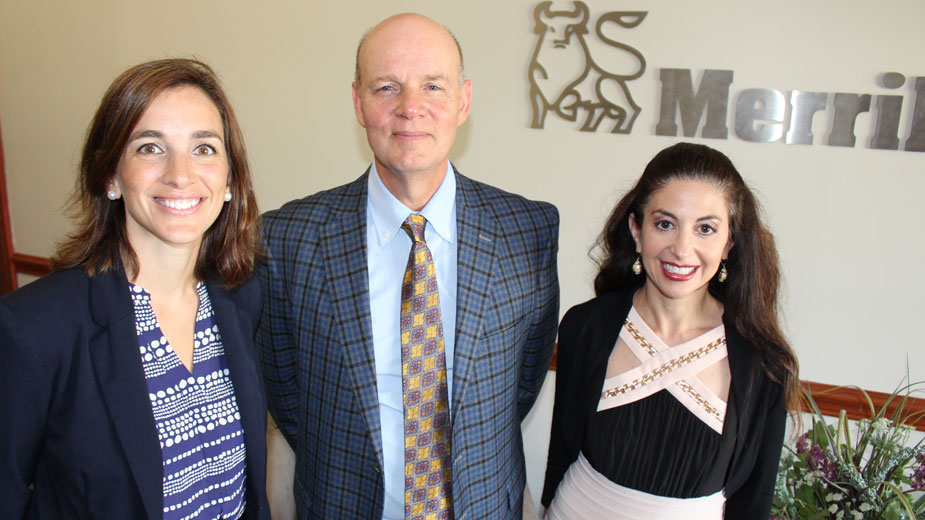Creating a Trust Can Bring Peace of Mind
YOUNGSTOWN, Ohio – Having to ask her clients the tough questions is part of Katie Solvesky’s job.
Where do you want your assets to go when you die? How do you want your assets to be distributed? Who do you trust to manage your assets if you’re incapacitated?
“You can’t plan for incapacity when you’re incapacitated or when there’s an accident,” says Solvesky, wealth management adviser at Merrill Lynch in Canfield. “It’s really important to have these conversations early on.”
“It’s not fun topics to talk about because you’re planning your life after death,” adds Natalie Lariccia, wealth management adviser at Merrill Lynch. “But it’s so worth doing that because then you have the peace of mind.”
A trust helps preserve, protect and control assets for current and future generations in a private manner without going through probate court.
There are five reasons why someone should set up a trust, Solvesky says.
If a couple has an estate of more than $10 million in net worth, a trust would help mitigate any federal estate tax obligations upon their deaths.
Another reason is to provide for a family member. For example, if a couple has young children, a trustee would help manage the finances for the children if the couple were to die unexpectedly. A trust can also help manage the assets of an adult child who is not fiscally responsible. Or, if the child is disabled and receiving Supplemental Security Income or Medicaid, a trust would ensure that he still would receive benefits and the trust’s assets wouldn’t count against him.
Other reasons are incapacity planning (who will manage your money if you can’t), charitable giving (if you want to give to a nonprofit when you die) and for protection of assets from creditors.
“There are certain professions, such as an attorney or doctor, that may be more susceptible to a lawsuit and they need some creditor protection,” Solvesky says.
But not everyone needs a trust to accomplish transferring of assets, she notes.
“Sometimes you can accomplish what you want to do using simple tools such as a transfer on death or power of attorney,” Solvesky says.
As wealth management advisers, there are two circumstances when a client’s trust is discussed at Merrill Lynch, says Sid Jones, managing director.
Jones reviews clients’ trusts and financial plans two to four times per year to check if any changes are needed. “We’re monitoring your wealth and generally dealing with the entire wealth of a client. We can spot when those things change and can send you back to your attorney and accountant,” he says.
When a client first thinks about setting up a trust, Jones will ask questions to determine the type of trust to establish. “What are you trying to accomplish? What is the complexity of your family?” he says. “We’re not going to give legal advice. We’re going to point them in the direction they need to go.”
At Huntington Bank, trust and wealth officers ask their private-banking customers similar questions when setting up a trust. “We want to understand their unique circumstance of needs,” says Bill Shivers, regional president of Huntington Bank. “We also act as a fiduciary administrator to trusts and estates.”
There’s no minimum amount needed to set up a trust, but customers in Huntington’s private-banking group – anyone with the potential for $1 million-plus in assets – have direct access to its trust and wealth officers.
Huntington Bank works with attorneys as well to make sure trusts are set up properly.
Couples who have young children frequently set up trusts for the purpose of delaying distributions and paying for college, says Jamie Dietz, attorney at Friedman & Rummell Co. in Canfield. “If a parent passes away, instead of the assets going all to the child, you keep it in the trust and the trustee will make sure the assets go to benefit the child’s education,” he says.
A common concern Dietz hears from clients is who will serve as the trustee. He advises the use of an independent or corporate trustee instead of a family member, so there’s no animosity between family members about who is making distributions.
“When someone dies, that typically is when the trust comes into play more than not,” Dietz says. “But remember: you have to get money into the trust somehow, whether when you’re alive or at your death. You make sure the assets get to the trust.”
A situation Dietz sees too often is when a client has all of his assets titled jointly with another individual and when the asset-holder dies, the assets go to the second person, completely bypassing the trust. “So your purpose for the trust isn’t served because there’s no money in it,” he says.
There are different types of taxes that relate to trusts and an important one is income tax on any funds that generate income.
“The question is who’s going to pay that tax?” Dietz says.
Since the trusts are typically taxed at a higher rate than individuals, often- times you want the tax to be passed out to individuals who pay income tax at a lower rate.
“The net result would be less tax would be paid because we’re paying at the individual rates over the trust rates,” Dietz says.
Still, with the Tax Cuts and Jobs Act of 2017, there’s less need for trusts as it relates to tax planning.
Last year, the estate tax exemption was $5.49 million per person and in 2018 it doubled to $11.18 million, so anyone who created a trust for their estate won’t be taxed on it until they cross that threshold.
The types of investments in a trust depend on what the trust is being used for, whether the purpose of the trust is to generate income or to grow assets.
“If the trust has been set up to provide income to the surviving spouse, then it’s not going to get filled up with a lot of growth stock because it doesn’t pay dividends,” says Carl Heltzel, financial adviser at Raymond James in Canfield. “It’s probably going to have more dividend-paying stocks.”
Among these would be bonds that pay a set amount of income quarterly or every six months.
If a trust was set up to grow the assets, you would want to invest in companies that are growing, such as Apple, Amazon or Google, Heltzel advises.
When setting up a trust, he tells clients to look at their situation and decide if this is relatively simple, or if the goal is to avoid probate, or if the end result is much more complicated.
A complicated trust situation could be, “My wife and I want to set up a trust but it’s a second marriage and we each have children from our previous marriages that now are in our combined family,” Heltzel explains.
Setting up a trust properly is important because it may be difficult to change once a grantor establishes it, puts money in and passes away.
“The trust can really have an impact on people’s lives so you want to do it correctly. You don’t want to do it with a casual attitude or the cheapest way you can find,” Heltzel says. “Do your homework and find attorneys that have experience in setting up trusts.”
Pictured: Katie Solvesky, Sid Jones and Natalie Lariccia review trusts with Merrill Lynch clients.
Copyright 2024 The Business Journal, Youngstown, Ohio.


